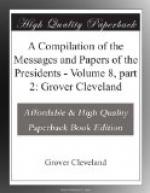The so-called deputy marshals provided for in this bill will have no executive head. The marshal can neither appoint nor remove them. He can not control them, and he is not responsible for them. They will have no authority to call to their aid, if resisted, the posse comitatus. They are protected by no criminal statutes in the performance of their duties. An assault upon one of these deputies with the intent to prevent a lawful election will be no more than an ordinary assault upon any other citizen. They can not keep the peace. They can not make arrests when crimes are committed in their presence. Whatever powers they have are confined to the precincts in which they reside. Outside of the precincts for which they are appointed the deputy marshals of this bill can not keep the peace, make arrests, hold prisoners, take prisoners before a proper tribunal for hearing, nor perform any other duty. No oaths of office are required of them, and they give no bond. They have no superior who is responsible for them, and they are not punishable for neglect of duty or misconduct in office. In all these respects this bill makes a radical change between the powers of the United States officers at national elections and the powers uniformly possessed and exercised by State officers at State elections. This discrimination against the authority of the United States is a departure from the usage of the Government established by precedents beginning with the earliest statutes on the subject, and violates the true principles of the Constitution. The Supreme Court, in the decision already referred to, says:
It is argued that the preservation of peace and good order in society is not within the powers confided to the Government of the United States, but belongs exclusively to the States. Here again we are met with the theory that the Government of the United States does not rest upon the soil and territory of the country. We think that this theory is founded on an entire misconception of the nature and powers of that Government. We hold it to be an incontrovertible principle that the Government of the United States may, by means of physical force, exercised through its official agents, execute on every foot of American soil the powers and functions that belong to it. This necessarily involves the power to command obedience to its laws, and hence the power to keep the peace to that extent.
This power to enforce its laws and to execute its functions in all places does not derogate from the power of the State to execute its laws at the same time and in the same places. The one does not exclude the other, except where both can not be executed at the same time. In that case the words of the Constitution itself show which is to yield. “This Constitution and all laws which shall be made in pursuance thereof * * * shall be the supreme law of the land.”
In conclusion it is proper to say that no objection




